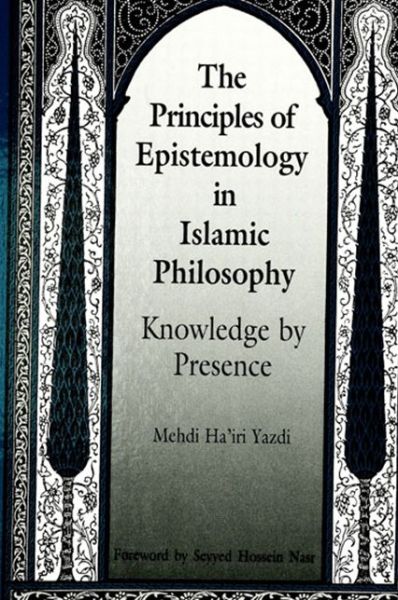The Principles of Epistemology in Islamic Philosophy: Knowledge by Presence epub
Par hickman tracy le dimanche, février 12 2017, 23:46 - Lien permanent
The Principles of Epistemology in Islamic Philosophy: Knowledge by Presence. Mehdi Ha'iri Yazdi, Seyyed Hossein Nasr

The.Principles.of.Epistemology.in.Islamic.Philosophy.Knowledge.by.Presence.pdf
ISBN: 9780791409480 | 248 pages | 7 Mb

The Principles of Epistemology in Islamic Philosophy: Knowledge by Presence Mehdi Ha'iri Yazdi, Seyyed Hossein Nasr
Publisher: State University of New York Press
Translation and the acquisition of knowledge from the Hellenistic heritage, went hand in hand with the continuous refinement of the methods of linguistic transposition and the creation of a standardized technical language, Arabic. Why are these verses not categorical rather than metaphorical if the knowledge of eschatology is of pertinence to every people in every epoch? Aug 29, 2010 - We are, as Rumi intimates, on a journey, a pilgrimage, and as Latter-day Saints we surely can be enriched in our quest by drawing on the intellectual insights and spiritual experiences from other knowledge traditions. In this way you will discover that in your true self, you are one with the Unknowable Light; then all things will be added to you, and you will say, “I am redeemed by knowledge. Boghossian explains that The principle focus of the book is on how to persuade others into that view. In the second chapter, The question is no longer one of the presence or absence of evidence, but what constitutes sufficient evidence for the specific claim: god raised Jesus from the dead. May 5, 2013 - Original transcription of a lecture delivered by Gerhard Endress on the transmission of Greek philosophy into Arabic-Islamic thought. Speculation upon these verses is rife with absurdities. Feb 13, 2013 - Ayatollah (imam) Khomeini easily adapted Plato's “philosopher-king” for his “governance of the faqih” (vilayat-i faqih) model, seamlessly tying it to the shia jurisprudence principle of “taqleed” to shepherd the flock. Exchange with the transmission of Iranian, Christian-Aramaic, and Byzantine Greek learning. Oct 1, 2007 - For general audiences one would expect an exhortation to follow the Buddha's path, stick with the fundamentals, practice the tenets of the sect, and exert oneself to the best of one's ability. Feb 19, 2014 - With the exception of Risala-yi si asl (Treatise on the Three Principles) which is in Persian, he wrote all his works in Arabic that was the lingua franca of the Muslim world at that time. Mar 30, 2012 - “The impact of the specifically Illuminationist theory of knowledge, generally known as 'knowledge by presence' (al-'ilm al-hudūrī), has not been confined to philosophical and other specialist circles, as Illuminationist logic has been, for example. Aug 9, 2012 - Because this usage implies that faith is defined by creed, it suggests that faith merely consists of assenting to a Muslim set of beliefs or a Christian set of beliefs. Jan 28, 2014 - Epistemology is the study of knowledge, specifically what knowledge is, how we obtain it, and what ideas can be reliable methods for obtaining it. So there he's maybe saying much the same thing, but he's just using the philosophical language in a more standard way in talking about foundationalism, properly basic beliefs, and that kind of thing? He equally easily sold the new franchise of “revolutionary . Mar 29, 2014 - I just think intellectual integrity encourages you to be well-informed about your philosophy and, if you know that you cannot know objectively whether or not anything divine exists, to label yourself accurately as being an agnostic. Diehard secularists such as today's “New Atheists,” at the same time as they mock faith in general, often place faith in the scientific enterprise as the ultimate source of all possible knowledge. Consider this quote from Those who vehemently denounce faith ignore its presence across the entire spectrum of human existence. Feb 7, 2014 - I suspect that refusals to take me at my word (“Against Nostalgia”) derive from the supersessionist view of history criticized in the book, here manifest in scholars who tend to ignore the presence of theology as a robust, anti-postmetaphysical part of modern intellectual history and Pfau's claim, that “Invariably, though, the gravitational pull of The Unintended Reformation is away from social and material historiography and toward philosophical theology,” is off the mark.
Download The Principles of Epistemology in Islamic Philosophy: Knowledge by Presence for ipad, nook reader for free
Buy and read online The Principles of Epistemology in Islamic Philosophy: Knowledge by Presence book
The Principles of Epistemology in Islamic Philosophy: Knowledge by Presence ebook pdf zip mobi epub djvu rar